Are you ready to transform your garden into a thriving oasis? With our expert gardening tips and professional garden maintenance advice, you’ll have all the knowledge and tools you need to master your green thumb.
Gardening is not just about beautiful flowers and delicious fruits and vegetables. It is a skill that requires planning, knowledge, and consistent maintenance. Whether you’re a beginner or an experienced gardener, our garden servicing tips will help you achieve a successful and vibrant garden.
At the Clemson University Home & Garden Information Center, you can find research-based information on landscaping, gardening, plant health, and much more. Their valuable resources can enhance your gardening skills and provide you with expert guidance.
When planning your garden, it’s essential to consider factors such as climate, soil type, and sunlight exposure. Understanding these elements will help you select the right plants that will thrive in your specific conditions. For beginners, we recommend starting with plants like lettuce and tomatoes, as they are relatively easy to grow and maintain.
Equipping yourself with the right tools is crucial for efficient garden maintenance. A good shovel, hand trowel, bypass, Hori Hori knife, and gloves are some of the essential tools that every gardener should have in their arsenal.
The quality of your soil plays a vital role in the health and growth of your plants. Adding compost or organic matter can improve soil quality by providing essential nutrients and improving drainage. This will create an optimal growing environment for your plants.
Fertilizers, like Milorganite, can further enhance your plant’s nutrition. By following the instructions for application, you can ensure that your plants receive the necessary nutrients for healthy growth and development.
Regular maintenance is key to a thriving garden. This includes watering, weeding, and harvesting. By providing appropriate care and attention to your plants, you’ll be rewarded with bountiful harvests and beautiful blooms.
Gardening offers more than just a picturesque landscape. It promotes stress relief, elevates mood, and contributes to a healthier lifestyle. By immersing yourself in nature and nurturing your plants, you can enjoy the therapeutic benefits that gardening provides.
Key Takeaways:
- Plan your garden based on climate, soil type, and sunlight exposure.
- Start with beginner-friendly plants like lettuce and tomatoes.
- Equip yourself with the essential tools for efficient garden maintenance.
- Improve soil quality by adding compost or organic matter.
- Use fertilizers like Milorganite to provide optimal nutrition for your plants.
Before you dive into the actual gardening, it’s crucial to plan your garden with care. By considering factors like climate, soil type, and sunlight exposure, you can ensure that your garden thrives throughout the year. The Clemson University Home & Garden Information Center provides research-based information on landscaping, gardening, plant health, and more that can help improve your gardening skills.
When selecting plants for your garden, it’s important to choose ones that are well-suited to your specific climate. Different plants thrive in different temperature ranges, so it’s essential to understand the typical weather patterns in your region. The Clemson University Home & Garden Information Center offers valuable resources to help you identify the best plants for your local climate.
Soil type is another critical factor to consider when planning your garden. Some plants prefer sandy soil, while others thrive in clay or loamy soil. Understanding the composition of your soil can help you select plants that will flourish in your garden. The Clemson University Home & Garden Information Center provides guidance on soil testing and amendments to improve soil quality for optimal plant growth.
Table 1: Recommended Plants Based on Soil Type
| Soil Type | Recommended Plants |
|---|---|
| Sandy Soil | Sunflowers, Lavender, Rosemary |
| Clay Soil | Lilies, Hostas, Black-Eyed Susans |
| Loamy Soil | Tomatoes, Peppers, Basil |
Sunlight exposure is another vital consideration for planning your garden. Some plants thrive in full sun, while others prefer partial shade or full shade. By understanding the amount of sunlight your garden receives throughout the day, you can ensure that you select plants that will thrive in your specific lighting conditions. The Clemson University Home & Garden Information Center offers advice on determining the sunlight exposure in your garden and selecting suitable plants accordingly.
Remember, proper planning is key to a successful garden. By considering climate, soil type, and sunlight exposure, you can create a garden that thrives year-round. The Clemson University Home & Garden Information Center is an invaluable resource for expert gardening tips and advice. By utilizing their research-based information, you can enhance your gardening skills and create a beautiful, thriving garden.
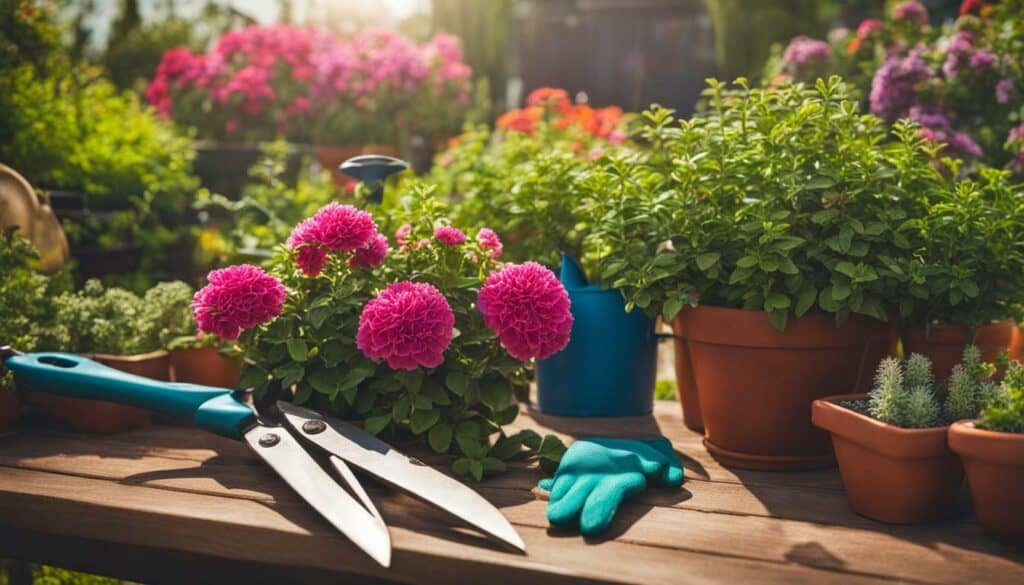
If you’re new to gardening, don’t fret! We have some gardening hacks and easy gardening tips that will help you get started on the right foot. Gardening is a rewarding and enjoyable activity that allows you to connect with nature and cultivate your own beautiful green space. By choosing the right plants for beginners, you can ensure a successful and flourishing garden.
One of the best gardening hacks for beginners is to start with plants that are known for their ease of growth and maintenance. Lettuce and tomatoes are two excellent options that are recommended for those just starting out. Lettuce is a versatile leafy green that can be grown in containers or raised beds, making it perfect for small spaces. Tomatoes, on the other hand, are a classic garden staple that are relatively easy to grow and yield delicious fruits.
When selecting plants for your beginner’s garden, it’s important to consider factors such as sunlight exposure, soil type, and climate. Different plants have different requirements, so it’s essential to choose those that will thrive in your specific conditions. For example, if you have limited sunlight, you can opt for shade-loving plants like hostas or ferns.
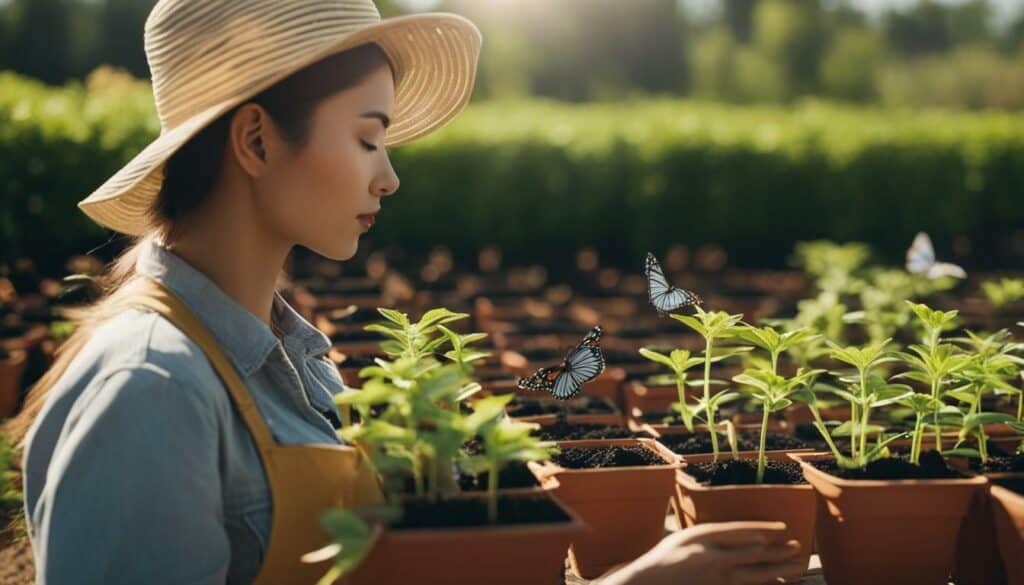
As you embark on your gardening journey, be sure to equip yourself with the necessary tools. A good shovel, hand trowel, bypass pruners, Hori Hori knife, and gloves are essential for any gardener. These tools will help you dig, plant, and maintain your garden with ease. Remember to clean and store your tools properly after use to ensure their longevity.
With these gardening hacks and easy gardening tips, you’ll be well on your way to creating a thriving garden. Remember to follow the planting instructions of each plant and provide regular maintenance, including watering, weeding, and harvesting. By nurturing your garden, you’ll not only enjoy the fresh produce but also experience the stress relief, mood elevation, and healthier lifestyle that gardening provides.
Gardening Tips for Beginners:
- Start with beginner-friendly plants like lettuce and tomatoes.
- Consider factors such as sunlight exposure, soil type, and climate when selecting plants.
- Equip yourself with essential gardening tools like a shovel, hand trowel, bypass pruners, Hori Hori knife, and gloves.
- Follow the planting instructions of each plant and provide regular maintenance, including watering, weeding, and harvesting.
Remember, gardening is a learning process, and with each season, you’ll gain more knowledge and experience. So, roll up your sleeves, get your hands dirty, and enjoy the beauty and satisfaction that comes with nurturing your own garden!
| Benefits of Gardening: | Seasonal Garden Care Tips: |
|---|---|
| Stress relief | Prune deciduous trees and shrubs in late winter or early spring |
| Mood elevation | Divide and transplant perennials in early spring or fall |
| Healthier lifestyle | Apply a layer of mulch to retain moisture and suppress weeds |
Essential Tools for Garden Maintenance
To ensure your garden stays healthy and beautiful, it’s essential to have the right tools for garden maintenance. Whether you’re a novice gardener or a seasoned green thumb, having the proper equipment can make all the difference in achieving optimal results. Here are some must-have tools to keep your garden thriving:
1. Shovel: A sturdy shovel is essential for digging, planting, and moving soil. Look for one with a comfortable handle and a sharp, durable blade.
2. Hand Trowel: This small, handheld tool is perfect for digging small holes, transplanting seedlings, and loosening soil in tight spaces. Choose one with a comfortable grip and a sturdy construction.
3. Bypass Pruners: Pruning is an important part of garden maintenance, allowing you to remove dead or diseased branches and shape your plants. Bypass pruners are ideal for clean cuts, as they have two sharp blades that pass by each other.
| Tool | Description |
|---|---|
| Shovel | A sturdy digging and moving tool. |
| Hand Trowel | A small tool for digging and transplanting. |
| Bypass Pruners | Ideal for clean cuts during pruning. |
| Hori Hori Knife | A versatile tool for various gardening tasks. |
| Gloves | Protect your hands while gardening. |
4. Hori Hori Knife:
A Hori Hori knife is a multipurpose tool that can be used for digging, weeding, cutting roots, and even measuring soil depth. Its sharp, serrated blade and sturdy construction make it a valuable addition to your gardening toolkit.
5. Gloves: Gardening gloves protect your hands from cuts, scratches, and thorny plants. Look for gloves made of durable material that fit well and provide flexibility.
Having the right tools on hand can make your gardening tasks easier and more enjoyable. Invest in quality tools that will last, and you’ll be well-equipped to take care of your garden and enjoy the fruits of your labor.
Healthy plants start with healthy soil. In this section, we’ll explore the wonders of compost and organic matter in improving soil quality for a flourishing garden.
Compost is often referred to as black gold for gardeners, and for good reason. It is a nutrient-rich organic matter that enhances soil structure and fertility. When added to the soil, compost improves its ability to retain moisture, increases nutrient availability, and promotes beneficial microbial activity.
Organic matter, such as leaf mulch or well-rotted manure, is another excellent soil amendment. It helps break up heavy clay soils, improves drainage in compacted soils, and increases water-holding capacity in sandy soils. Additionally, organic matter provides a slow-release source of nutrients, feeding plants over time.
To incorporate compost and organic matter into your garden, start by spreading a layer of compost evenly over the soil surface. Aim for a thickness of about one to two inches. Then, use a garden fork or rake to gently work the compost into the top few inches of soil. This ensures that the nutrients are well distributed and readily available to the plant roots.
For an even more targeted approach, consider making compost tea or using vermicompost. Compost tea is created by steeping compost in water, producing a liquid fertilizer that can be applied directly to the plants. Vermicompost, on the other hand, is produced by worms that break down organic matter, resulting in a highly nutrient-rich compost.
Remember, healthy soil leads to healthy plants, so don’t underestimate the power of compost and organic matter. By enriching your soil, you’ll create an ideal environment for your plants to thrive.
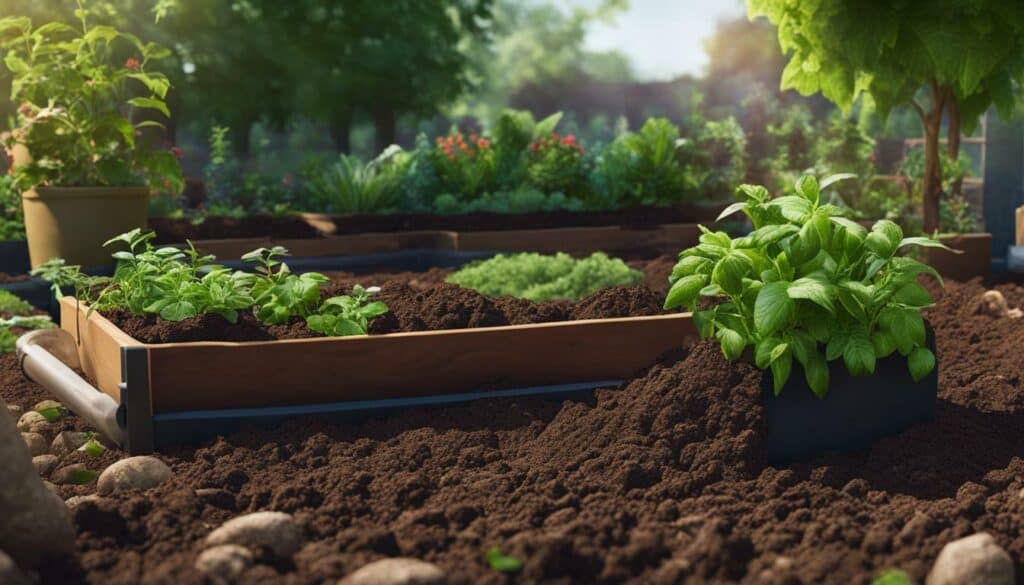
Just like we need proper nutrition, so do our plants. In this section, we’ll explore the importance of fertilizers in nourishing your prized garden. Fertilizers provide essential nutrients that plants need to grow and thrive, ensuring they reach their full potential.
When it comes to fertilizers, one popular option is Milorganite. This organic fertilizer is made from treated sewage sludge, which is rich in nutrients like nitrogen, phosphorus, and potassium. Milorganite is slow-release, meaning it releases nutrients gradually over time, providing a steady supply for your plants.
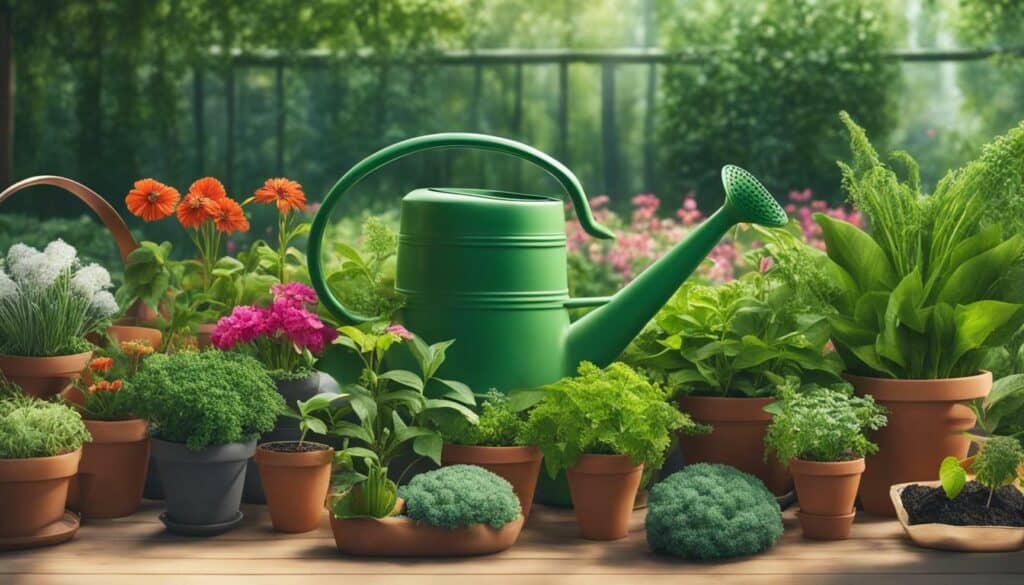
Using fertilizers like Milorganite is simple. Just follow the instructions on the packaging for application rates and timing. For most plants, it’s best to apply fertilizer in the spring when they begin actively growing. Be sure to water your plants after applying the fertilizer to help the nutrients penetrate the soil.
| Fertilizer | Nitrogen (N) | Phosphorus (P) | Potassium (K) |
|---|---|---|---|
| Milorganite | 6% | 4% | 0% |
| Other Fertilizer 1 | 10% | 10% | 10% |
| Other Fertilizer 2 | 20% | 5% | 10% |
Remember, it’s important to read and follow the instructions for any fertilizer you use. Each type of plant may have different nutrient requirements, so be sure to research the specific needs of your plants to ensure they receive the right fertilization.
Regular Maintenance: Watering, Weeding, and Harvesting
Maintaining a garden requires more than just planting. In this section, we’ll dive into the essential tasks of watering, weeding, and harvesting to keep your garden thriving.
Watering is a crucial aspect of garden maintenance. The needs of your plants will vary depending on factors such as the type of plant, weather conditions, and soil moisture. It’s important to water your garden consistently, ensuring that the soil remains moist but not waterlogged. A good rule of thumb is to water deeply and less frequently, allowing the roots to absorb the water properly. Consider investing in a drip irrigation system or using a soaker hose to provide targeted watering, minimizing water waste and maximizing efficiency.
Weeding is another vital task in maintaining a healthy garden. Weeds compete with your plants for nutrients, sunlight, and water, hindering their growth. Regularly inspect your garden for any unwanted plants and remove them promptly, roots and all, to prevent them from spreading. Mulching around your plants can help suppress weed growth by blocking sunlight and conserving soil moisture. When weeding, be careful not to damage the roots of your desired plants.
Harvesting your crops at the right time is the ultimate reward for your gardening efforts. Different plants have varying maturity periods, so it’s crucial to know when to harvest each crop. Check for signs of ripeness, such as color, texture, and size. Some vegetables, like tomatoes, are best harvested when fully ripe, while others, like lettuce, are better picked when young and tender. Remember to use proper harvesting techniques, using clean and sharp tools to minimize damage to the plants.
| Task | Frequency | Tips |
|---|---|---|
| Watering | Varies | Water deeply and less frequently. Consider using drip irrigation or a soaker hose. |
| Weeding | Regularly | Remove weeds promptly to prevent them from competing with your plants. Mulch to suppress weed growth. |
| Harvesting | Varies | Check for signs of ripeness and use proper harvesting techniques to minimize damage to plants. |
By prioritizing watering, weeding, and harvesting, you’ll ensure that your garden stays healthy and productive. Remember to observe the needs of your plants, provide regular maintenance, and enjoy the fruit of your labor.
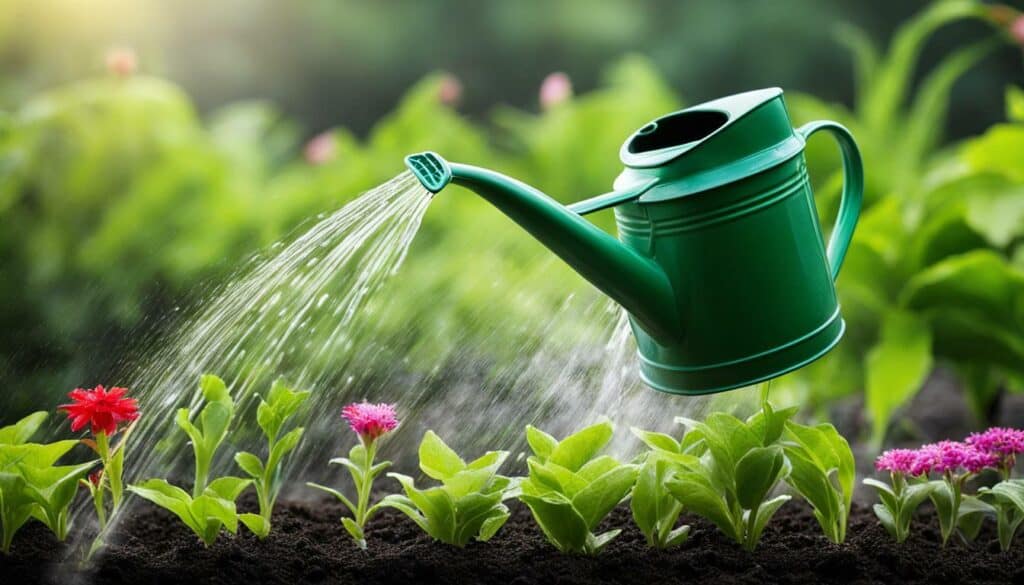
Gardening offers more than just a lovely garden; it can provide you with a multitude of benefits for your mind, body, and soul. The act of tending to plants and watching them grow can be incredibly therapeutic, helping to reduce stress and promote relaxation. Whether you have a small balcony garden or a sprawling backyard, spending time outdoors and connecting with nature can have a calming effect on your overall well-being.
Research has shown that gardening can also have a positive impact on your physical health. It is a great way to incorporate physical activity into your daily routine, whether it’s digging, planting, or pruning. These activities can help strengthen muscles, improve flexibility, and increase endurance. Gardening also encourages a healthier lifestyle by providing fresh, homegrown produce that is free from harmful pesticides and chemicals. There’s nothing quite like the taste of a sun-ripened tomato or crisp lettuce straight from your garden.
To fully enjoy the benefits of gardening, it’s important to create a space that brings you joy and meets your specific needs. Consider incorporating elements such as fragrant flowers, soothing water features, or a cozy seating area where you can unwind and recharge. The Clemson University Home & Garden Information Center is a valuable resource that can provide expert gardening tips to enhance your gardening experience and create a space that truly reflects your personal style.
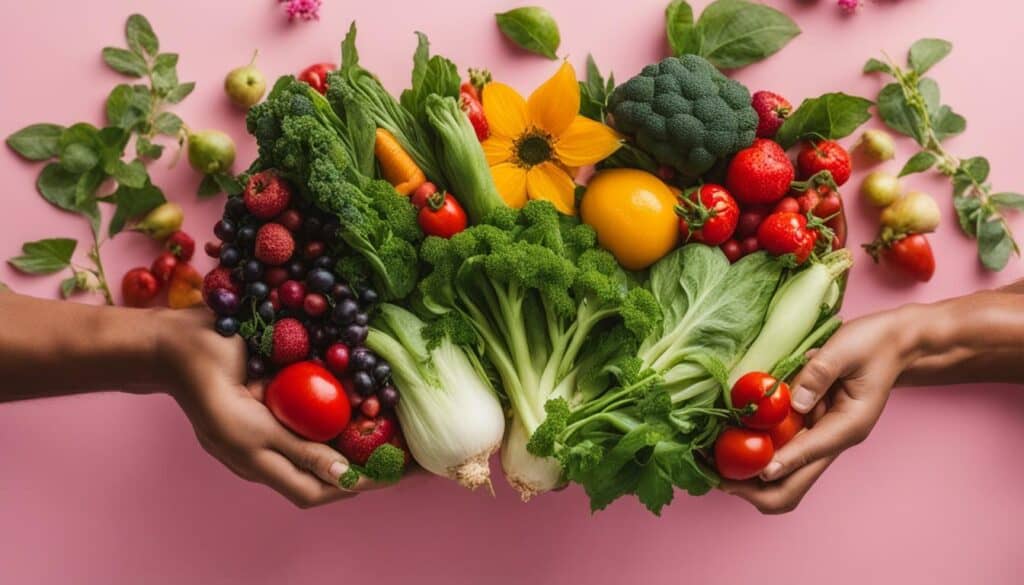
| Benefits of Gardening: | How it Can Improve Your Life: |
|---|---|
| Stress Relief | Gardening can help reduce stress levels and promote relaxation. |
| Physical Health | Engaging in gardening activities provides a form of exercise that can improve strength, flexibility, and endurance. |
| Healthier Lifestyle | Growing your own fresh produce ensures that you have access to nutritious, pesticide-free food. |
| Personalized Space | Create a garden that brings you joy and reflects your unique style and personality. |
So, whether you’re an experienced gardener or just starting out, don’t underestimate the power of tending to plants. Embrace the benefits of gardening and unlock the potential for a healthier, happier life.
The Clemson University Home & Garden Information Center
For even more expert gardening tips and resources, look no further than the Clemson University Home & Garden Information Center. This valuable resource provides research-based information on landscaping, gardening, plant health, and more, helping to enhance your gardening skills and knowledge. Whether you’re a beginner or an experienced gardener, the Home & Garden Information Center offers a wealth of information to help you succeed.
When it comes to gardening, understanding your local climate, soil type, and sunlight exposure is crucial. The Home & Garden Information Center can provide guidance on selecting the right plants for your specific conditions, ensuring greater success in your garden. For beginners, they recommend starting with plants like lettuce and tomatoes, which are relatively easy to grow and maintain.
To achieve beautiful and thriving gardens, having the right tools is essential. The Home & Garden Information Center can advise you on the must-have tools for garden maintenance, such as a good shovel, hand trowel, bypass, Hori Hori knife, and gloves. With these tools in hand, you’ll be equipped to tackle any gardening task with ease.
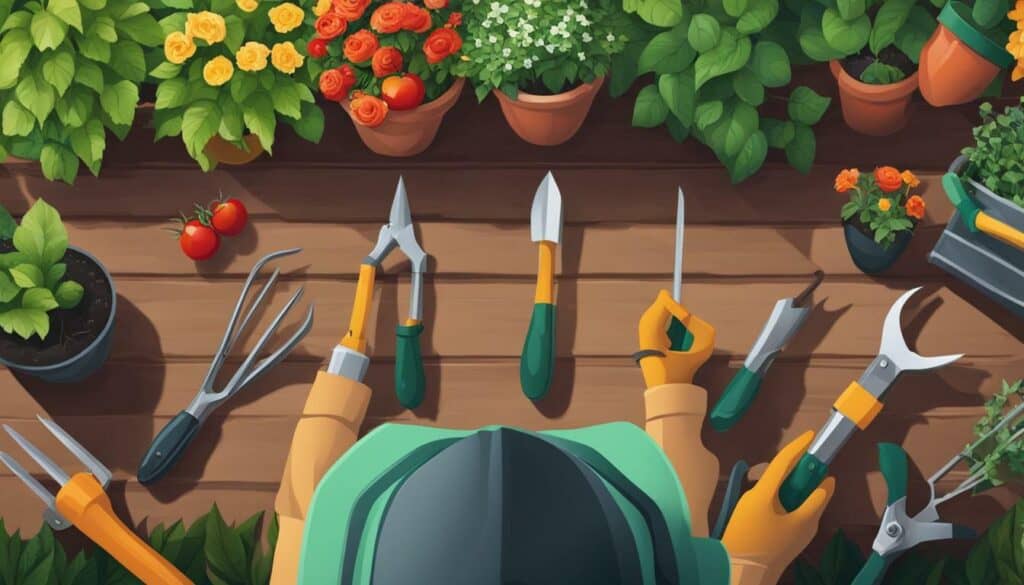
Improving soil quality is vital for healthy plant growth, and the Home & Garden Information Center can guide you in enriching your soil with compost and organic matter. They provide expert gardening tips on how to properly amend your soil to provide optimum nutrition for your plants, ensuring they thrive and flourish.
Expert Tip:
“Don’t forget the importance of regular maintenance in your garden. Watering, weeding, and harvesting are all crucial tasks to ensure your plants receive the care they need for peak performance. The Home & Garden Information Center offers expert advice on these essential maintenance practices.”
Gardening is not only a rewarding hobby but also offers numerous benefits for your well-being. Research has shown that gardening can reduce stress, elevate mood, and contribute to a healthier lifestyle. So, take the time to indulge in your green thumb and enjoy the many advantages of nurturing your own garden.
For even more expert gardening tips and resources, look no further than the Clemson University Home & Garden Information Center. With their extensive knowledge and research-based information, you’ll be well-equipped to create and maintain a beautiful and thriving garden.
| Gardening Tips from the Home & Garden Information Center |
|---|
| Research your local climate, soil type, and sunlight exposure to select the right plants. |
| Start with beginner-friendly plants like lettuce and tomatoes. |
| Invest in essential gardening tools such as a shovel, hand trowel, bypass, Hori Hori knife, and gloves. |
| Improve soil quality with compost and organic matter. |
| Ensure regular maintenance tasks like watering, weeding, and harvesting are done consistently. |
Conclusion on Garden Servicing Tips
Congratulations! You now have a wealth of garden servicing tips at your disposal to create a beautiful, thriving garden right in your backyard. By following expert advice and implementing best practices for garden upkeep, you can master your green thumb and enjoy the rewards of a flourishing outdoor space.
Remember to plan your garden with care, considering factors such as climate, soil type, and sunlight exposure. This will help you select the right plants that are suitable for your specific conditions. Start with beginner-friendly plants like lettuce and tomatoes, which are relatively easy to grow and maintain, and gradually expand your gardening skills from there.
Equipping yourself with essential tools like a good shovel, hand trowel, bypass, Hori Hori knife, and gloves is crucial for successful garden maintenance. These tools will enable you to tackle various tasks efficiently and with ease.
Don’t forget to give your plants the nourishment they need by improving soil quality with compost and organic matter. Fertilizers, such as Milorganite, can also provide essential nutrients for optimal plant growth. Following planting instructions and providing regular maintenance, including watering, weeding, and harvesting, will ensure your garden thrives throughout the seasons.
Gardening goes beyond just creating a beautiful garden. It can also provide stress relief, elevate your mood, and contribute to a healthier lifestyle. So, get your hands dirty, embrace the joy of gardening, and enjoy the bountiful rewards it brings!
FAQ on Garden Servicing Tips
Q: What factors should I consider when planning my garden?
A: When planning your garden, it’s important to consider factors such as climate, soil type, and sunlight exposure. These factors will help you select the right plants for your garden and ensure their optimal growth.
Q: What are some beginner-friendly plants for gardening?
A: If you’re new to gardening, lettuce and tomatoes are great options. They are relatively easy to grow and maintain, making them perfect for beginners.
Q: What tools do I need for garden maintenance?
A: Essential tools for garden maintenance include a good shovel, hand trowel, bypass, Hori Hori knife, and gloves. These tools will help you perform various tasks like digging, planting, and pruning with ease.
Q: How can I improve the quality of my soil?
A: The quality of your soil can be improved by adding compost or organic matter. This will enrich the soil with nutrients, improve its structure, and promote healthy plant growth.
Q: What role do fertilizers play in gardening?
A: Fertilizers provide necessary nutrients to your plants. A product like Milorganite is a popular choice for gardeners. Make sure to follow the instructions provided on the packaging for the proper application of fertilizers.
Q: What maintenance tasks should I perform regularly in my garden?
A: Regular maintenance tasks in your garden include watering, weeding, and harvesting. These tasks are crucial for the health and growth of your plants and should be done consistently.
Q: What are the benefits of gardening?
A: Gardening not only provides fresh produce, but it also promotes stress relief, elevates mood, and contributes to a healthier lifestyle. It’s a rewarding activity that brings joy and relaxation.
Q: Where can I find more gardening information?
A: The Clemson University Home & Garden Information Center is a valuable resource that provides research-based information on landscaping, gardening, and plant health. Visit their website for expert gardening tips and advice.

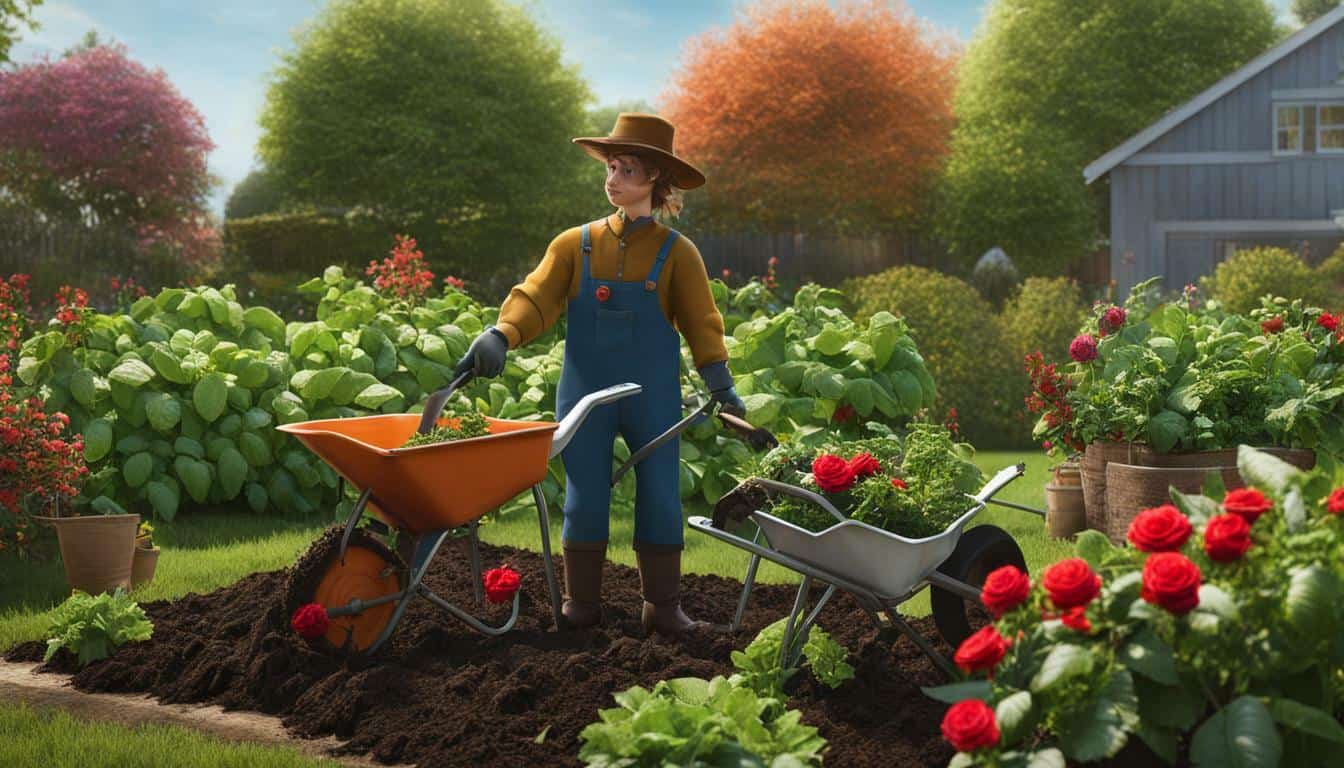
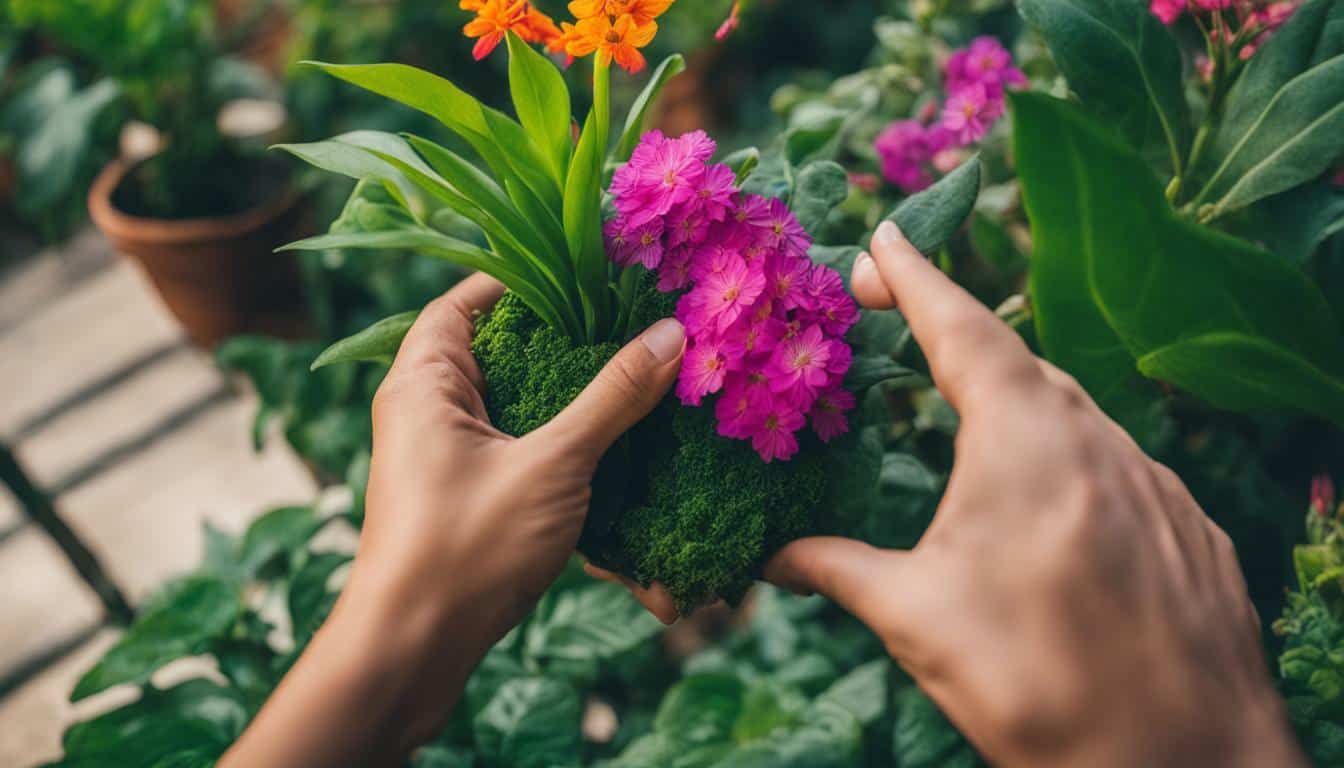
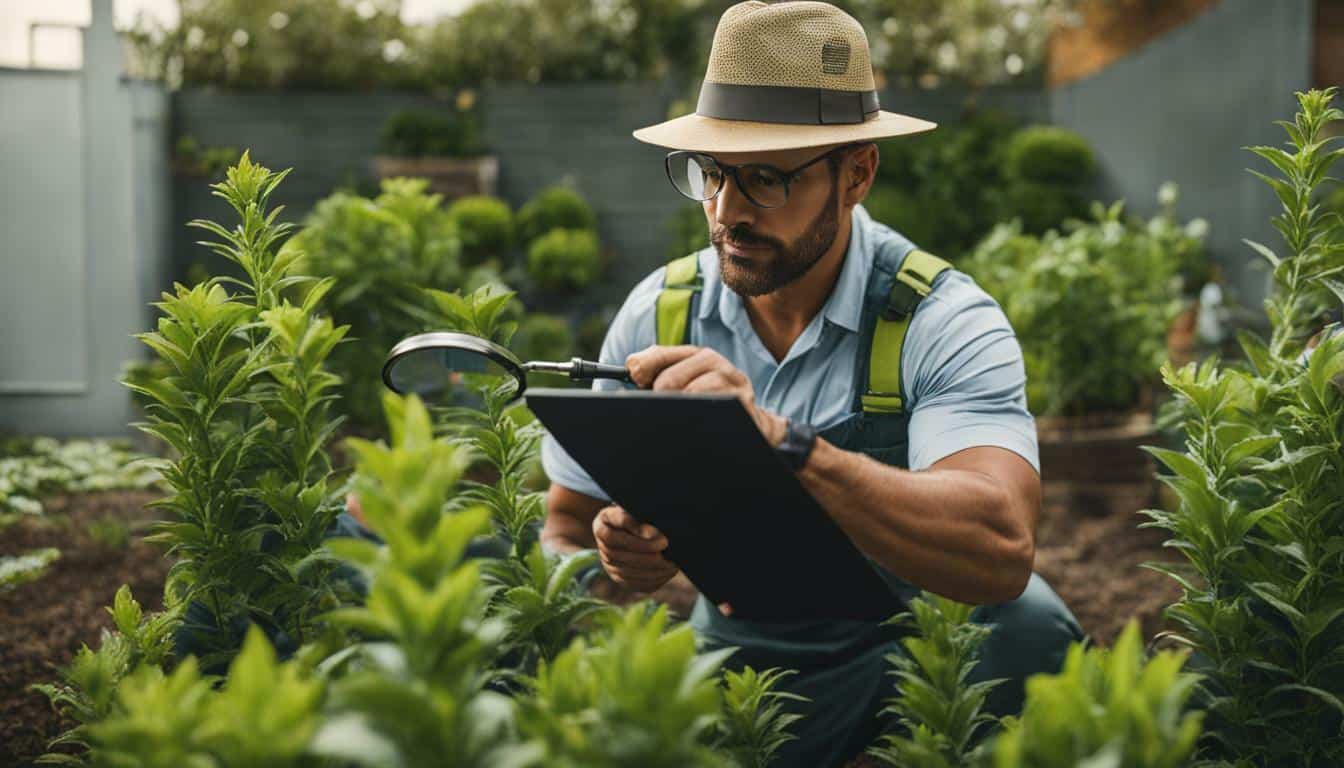

Leave a Reply